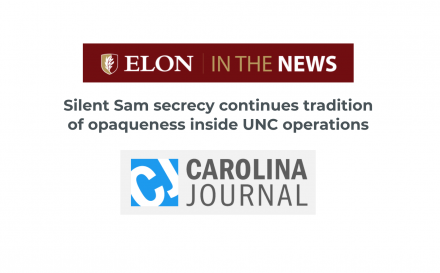Brooks Fuller, director of the North Carolina Open Government Coalition at Elon, addresses questions about transparency within the University of North Carolina System Board of Governors.
The Carolina Journal featured Brooks Fuller, director of the North Carolina Open Government Coalition and assistant professor of journalism, in a recent article about the University of North Carolina System Board of Governors and its handling of a controversial Confederate monument.
 The Silent Sam statue stood on the UNC-Chapel Hill campus until it was toppled by protesters in 2018. The UNC System Board of Governors, which is the governing body of North Carolina’s public universities, transferred possession of the monument and $2.5 million in a trust fund to the Sons of Confederate Veterans organization. The decision was left to a vote by the board’s governance committee, raising questions about transparency in this and previous actions by the Board of Governors.
The Silent Sam statue stood on the UNC-Chapel Hill campus until it was toppled by protesters in 2018. The UNC System Board of Governors, which is the governing body of North Carolina’s public universities, transferred possession of the monument and $2.5 million in a trust fund to the Sons of Confederate Veterans organization. The decision was left to a vote by the board’s governance committee, raising questions about transparency in this and previous actions by the Board of Governors.
“Openness is the default, not the exception,” Fuller told the Journal. “And I’m very afraid that when it comes to this particular lightning rod issue of Silent Sam, [the board] made openness the exception rather than the default. And that should be very easy to correct.”
Fuller also discussed the enforcement of open meetings laws and whether attorney/client privilege claims apply to bodies such as the Board of Governors.
To read the entire article, including further insights from Fuller, click here.


